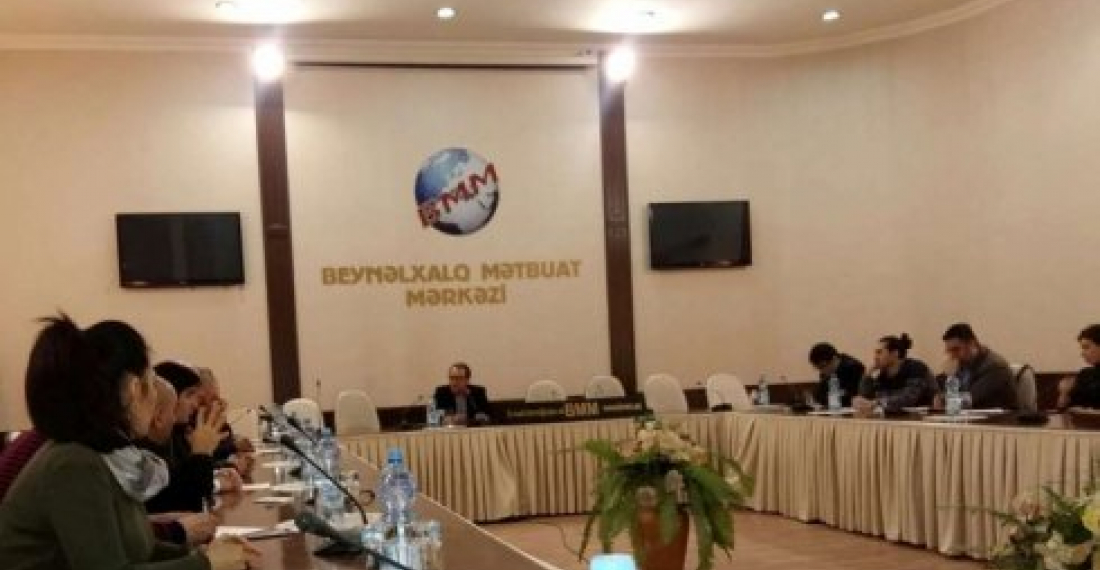Представители гражданского общества Азербайджана в понедельник (4 февраля) обсудили дальнейшие шаги на пути к миру в ходе круглого стола, организованного в Международном пресс-клубе в Баку. Мероприятие на тему: «Подготовка народов к миру: проблемы прошлого и настоящего» было организовано Общественным объединением гуманитарных исследований.
Руководитель организации Аваз Гасанов отметил, что 16 января после встречи министров иностранных дел Азербайджана и Армении в Париже было распространено заявление о необходимости подготовки народов двух стран к миру. Этот шаг может дать серьезный импульс процессу урегулирования конфликта, развитию региональной безопасности и устойчивому региональному развитию, сказал он.
Председатель Общества защиты прав женщин Дилара Алиева Новелла Джафароглу также подтвердила важность ведения диалога на пути к миру для народов. Она подчеркнула необходимость того, чтобы представители гражданского общества координировали свою деятельность в процессе построения мира. Она предложила организовать в ближайшее время встречу представителей гражданского общества и министра иностранных дел Азербайджана для обсуждения нагорно-карабахского конфликта.
В ходе мероприятия представители гражданского общества поделились опытом, ранее приобретенным представителями гражданского общества из Азербайджана и Армении. Независимый журналист Асаф Гулиев сказал, что представители гражданского общества имеют богатый опыт в этой области и могут быть вовлечены в процесс миростроительства.
Член Совета прессы Азер Хасрет заявил, что после встречи министров иностранных дел важность подготовки обществ к миру возрастает. «Мир должен быть объяснен обоим обществам. Необходимо предпринять шаги для устранения агрессивных отношений в обоих обществах», - сказал Хасрат.
Рауф Зейни, президент Национального форума неправительственных организаций, сказал, что в условиях, когда Азербайджан понес большие потери, миллион граждан являются беженцами и вынужденными переселенцами, будет нелегко объяснить потребность мира в стране населению. «Продолжение оккупации снижает доверие наших граждан к миру», - сказал он.
Координатор Азербайджано-армянской гражданской платформы Дилара Эфендиева рассказала о вкладе мирной платформы в нормализацию отношений между двумя народами. Она отметила, что у платформы мира есть потенциал для ускорения "таяния льда" между двумя странами посредством шагов, направленных на снижение напряженности между народами.
Правозащитник Саадат Бананярлы заявил, что «достижение мира должно стать условием восстановления справедливости». Председатель Бюро по правам человека Саида Годжаманлы сказала, что она ожидает, что люди будут более осторожны в переговорном процессе. «Люди, которые были изгнаны со своей родины, надеются в конечном итоге вернуться в свои дома», - сказала она.
Заур Шириев, аналитик Международной кризисной группы и представитель Специального представителя ЕС по Южному Кавказу Йоханна Кетола, подчеркнул важность правильной оценки роли гражданского общества в мирном процессе и использования их возможностей.
источник: commonspace.eu, информационное агентство Turan, Баку.
фото: Встреча гражданского общества Азербайджана для обсуждения процесса урегулирования карабахского конфликта, состоявшаяся 4 февраля 2019 года (фото любезно предоставлено contact.az)







